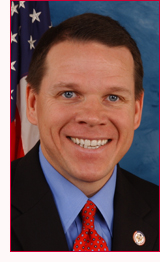Government Affairs
Small Businesses Drive Job Creation, Growth
Our nation is the mightiest economy on the planet, with great potential for growth. So why are we nearly stagnant? We’ve had weak job growth for months on end, and our lingering high unemployment has been at a rate of at least 8 percent for 41 straight months. That’s unacceptable. Even worse, it’s unnecessary. Our nation is attempting to rebound from a recession, but I’m afraid we’re asking our job creators to fight through obstacles of the federal government’s own making.
The latest economic data sheds light as to just how immobile our nation’s small businesses are. June’s addition of only 80,000 jobs was well below expectations and well short of the 150,000 jobs the Bureau of Labor Statistics says are needed every month just to keep pace with population growth. On Tuesday, the NFIB released its Small Business Optimism survey for June, which fell 3 points to its lowest level since October 2011.
We hear a lot of talk about jobs right now. Fact: Small firms are the biggest job creators. Yet, the vital role small businesses play in economic growth is still overlooked. Together, these small firms consistently create 60 to 70 percent of new jobs, year after year, and employ more than half of the entire U.S. workforce at 27 million different places of business. That means we all have a vested interest in keeping that dynamic job creation going strong.
Because small businesses drive our economy, why don’t their concerns drive more of our economic policies and priorities? Wouldn’t that make sense? We hear lip service from the administration, but their actions don’t back up their talking points. Often it seems that the one-size-fits-all policies of the federal government were developed with little thought for real-world small-business behavior.
Instead of unleashing the vast potential of small businesses, the federal government has weighed them down with red tape, mandates, taxes and uncertainty. Don’t overlook the consequences of uncertainty. Owners of small firms have testified over and over before the House Small Business Committee that they need certainty to plan and make long-term decisions. They need to know what tax rates and regulatory costs will be. Without that certainty, they are far less likely to invest in equipment or hire new people. Without reasonable certainty, they are far less likely to make a bold entrepreneurial choice with an element of calculated risk that might lead to a booming business.
We top that off with these facts: more than 30 bipartisan jobs bills are stalled in the Senate, the massive national debt keeps growing, a higher tax burden awaits job creators at the end of the year, healthcare costs are continuing to rise and businesses face too much regulatory red tape and paperwork. Each of these is like strapping a parachute behind a vehicle and then complaining that we’re slowing down.
 For evidence that the administration is not fully engaged on small-business issues, look no further than the federal contracting goals. Federal agencies should be awarding 23 percent of contracts competitively to small businesses. Instead, the number actually fell this year. Agencies have missed the mark for six straight years. It just hasn’t been made a priority throughout the federal government. We won’t sit idly as federal agencies endlessly miss this important goal. We demand real improvement, and the Committee on Small Business is taking steps to hold agencies accountable.
For evidence that the administration is not fully engaged on small-business issues, look no further than the federal contracting goals. Federal agencies should be awarding 23 percent of contracts competitively to small businesses. Instead, the number actually fell this year. Agencies have missed the mark for six straight years. It just hasn’t been made a priority throughout the federal government. We won’t sit idly as federal agencies endlessly miss this important goal. We demand real improvement, and the Committee on Small Business is taking steps to hold agencies accountable.
A bill I wrote, the Government Efficiency Through Small Business Contracting Act of 2012 (H.R. 3850), has broad bipartisan support and a companion bill in the Senate sponsored by a Democrat. If there was ever an issue on which we should be able to come together, even in an election year, this is it.
Yet, incredibly, the administration has expressed opposition to this modest change. This bill increases accountability within each agency and raises the goal from 23 percent to 25 percent. As we increase contracting opportunities for small businesses, we save money and create jobs. With high deficits and high unemployment, that just makes sense. Given the promise of small, innovative firms in America, the 25 percent goal should be viewed as a minimum, not a maximum.
The healthcare law is another great burden for small businesses, and our economy as a whole, and the worst impacts on the private sector are yet to come. Although the president promoted the healthcare law as not being a tax, the Supreme Court decided otherwise, further limiting the freedoms of Americans. The court’s surprising decision has not deterred House Republicans from acting to repeal and replace the law on behalf of the American people and small businesses. Instead, we need simple, commonsense reforms that put patients in charge and help bring down costs. Let’s replace it with a plan that returns control of healthcare decisions to individuals, not the government.
The American people deserve substantial growth that puts people to work. I know the federal government does not create private sector jobs, but we can promote growth by providing opportunity, certainty and commonsense policies that our job creators need.
Small businesses make a big difference. Let’s free up small firms from overzealous taxation and impose some regulatory restraint. If we do, they will play an oversized part in reinvigorating the economy. We must work with our nation’s job creators, not against them.

 Congressman Sam Graves, Missouri
Congressman Sam Graves, Missouri